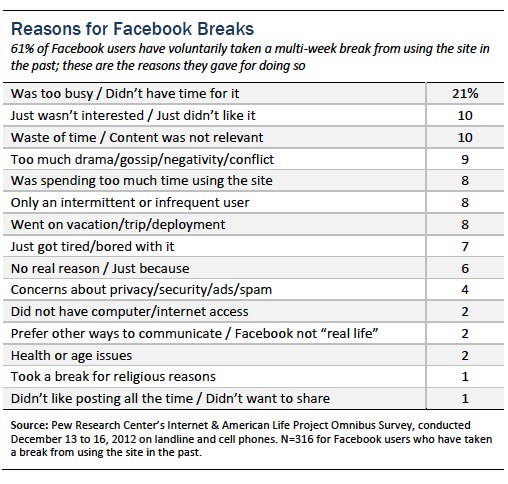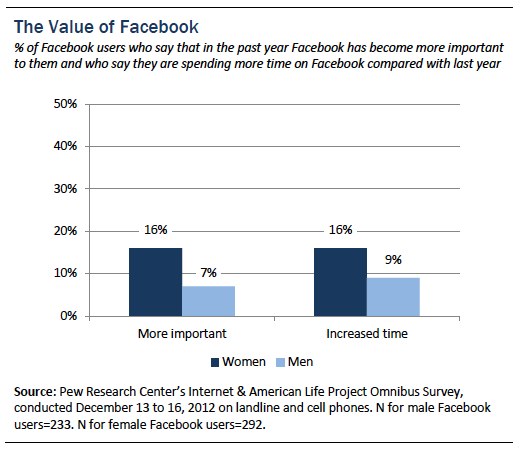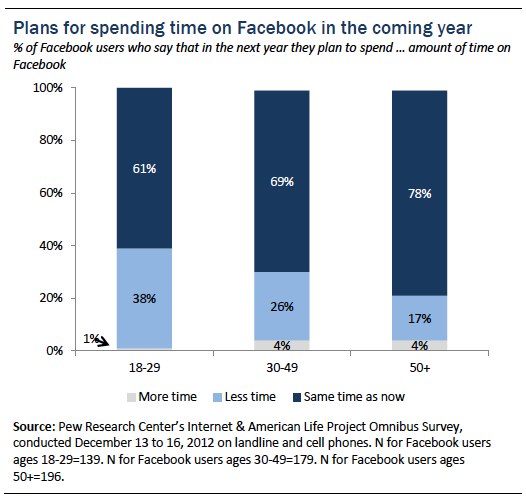Two-thirds of online American adults (67%) are Facebook users, making Facebook the dominant social networking site in this country.1 And new findings from the Pew Research Center’s Internet & American Life Project indicate there is considerable fluidity in the Facebook user population:
- 61% of current Facebook users say that at one time or another in the past they have voluntarily taken a break from using Facebook for a period of several weeks or more.
- 20% of the online adults who do not currently use Facebook say they once used the site but no longer do so.
- 8% of online adults who do not currently use Facebook are interested in becoming Facebook users in the future.
We asked the 61% of Facebook users who have taken a break from using the site to tell us in their own words why they did so, and they mentioned a variety of reasons. The largest group (21%) said that their “Facebook vacation” was a result of being too busy with other demands or not having time to spend on the site. Others pointed toward a general lack of interest in the site itself (10% mentioned this in one way or another), an absence of compelling content (10%), excessive gossip or “drama” from their friends (9%), or concerns that they were spending too much time on the site and needed to take a break (8%).

Some of the verbatim thoughts from those who took Facebook breaks include the following: “I was tired of stupid comments.” … “[I had] crazy friends. I did not want to be contacted.” … “I took a break when it got boring.” … “It was not getting me anywhere.” … “Too much drama.” … “You get burned out on it after a while.” … “I gave it up for Lent.” … “I was fasting.” … “People were [posting] what they had for dinner.” … “I didn’t like being monitored.” … “I got harassed by someone from my past who looked me up.”… “I don’t like their privacy policy.” … “It caused problems in my [romantic] relationship.”
One in five online adults (20%) say that they used Facebook in the past but no longer do so, and we also asked this group to tell us—in their own words—what made them stop using the site. Although the number of respondents who answered this question is too small to report detailed percentages, their answers covered many of the same themes of those who continue to use Facebook but have taken a break in the past. Some of their direct thoughts: “It’s a gossipy thing.” … “I didn’t like to talk too much.” … “I’m not social.” … “My account was compromised.” … “I got tired of minding everybody else’s business.” … “Not enough privacy.” … “Got too many communications.” … “Takes my time away.”
Findings in context: social networking site users are checking in more frequently than ever
Even as many Facebook users adjust their time allocations on the site for the reasons listed above, the vast majority of social networking site users — 92% of them, based on our most recent findings — maintain a profile on Facebook. And other Pew Internet survey findings illustrate the continued importance of social networking sites more generally to online life:
- As recently as September 2009, 47% of online adults used social networking sites. Today 69% of online adults — representing more than half of the entire adult population in the United States — use an online social network of some kind. On a typical day nearly half of all adult internet users access a social networking site.
- Social networking site users are accessing these sites more frequently than in the past. In a separate survey conducted in November 2012, some 41% of social networking site users said that they access these sites several times a day — a statistically significant increase from the 33% of users who said that they accessed social networking sites with that level of frequency in August 2011.
The value of Facebook to users and the time they spend on the site
When asked in the mid-December Omnibus survey to assess the amount of time they spend on Facebook and the general value of Facebook in their lives, a majority of users say the site is as important now as it was a year ago and about half say they use the site as much now as they did a year ago. However, notable numbers point to a decreasing value and a decline in usage over the past year.
- 59% of Facebook users say the social networking site is about as important to them as it was a year ago. And 53% of current users say the amount of time they are spending on Facebook has stayed about the same over the past year.
- 28% of Facebook users say the site has become less important to them than it was a year ago. And 34% of current users say the amount of time they are spending on Facebook has decreased over the past year.
- 12% of Facebook users say the social networking site has become more important to them than it was a year ago. And 13% of current users say the amount of time they are spending on Facebook has increased over the past year.
Women are more likely than men to report increased importance and greater time spent on the site. Some 16% of female users (and 7% of men) say that Facebook has become more important to them over the last year, and 16% of female users (and 9% of men) say that they spend more time on the site now than they did a year ago.
On the other hand, some 42% of Facebook users ages 18-29 and 34% of those ages 30-49 say that the time they spend on Facebook on a typical day has decreased over the last year — these are both significantly higher than the 23% of users ages 50 and older who report decreased Facebook usage over the same time period.

Plans for future use of Facebook
Asked about their plans for the coming year, most current users of Facebook say they expect their usage levels will stay about the same. But around one in four say they plan to cut back on their Facebook usage in 2013:
- 3% of Facebook users say they plan to spend more time on the site in the coming year.
- 27% of Facebook users say they plan to spend less time on the site in the coming year.
- 69% of Facebook users say they plan to spend the same amount of time on the site this coming year.
Young adults are the most likely forecasters of decreased engagement. Some 38% of Facebook users ages 18-29 expect to spend less time using the site in 2013, although a majority of users across age groups anticipate that their Facebook usage will remain largely stable in the year to come.



